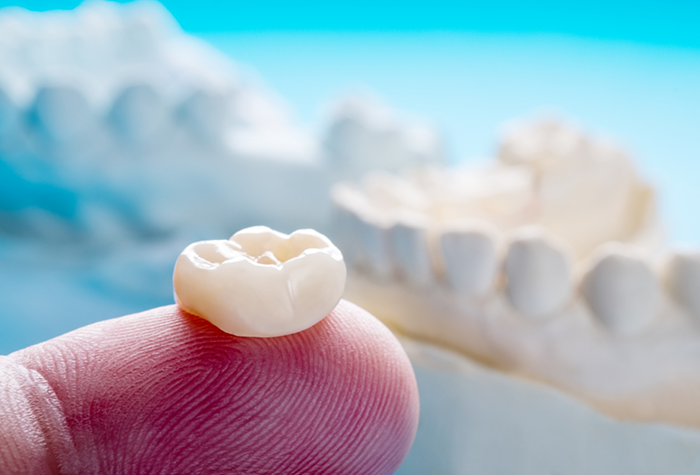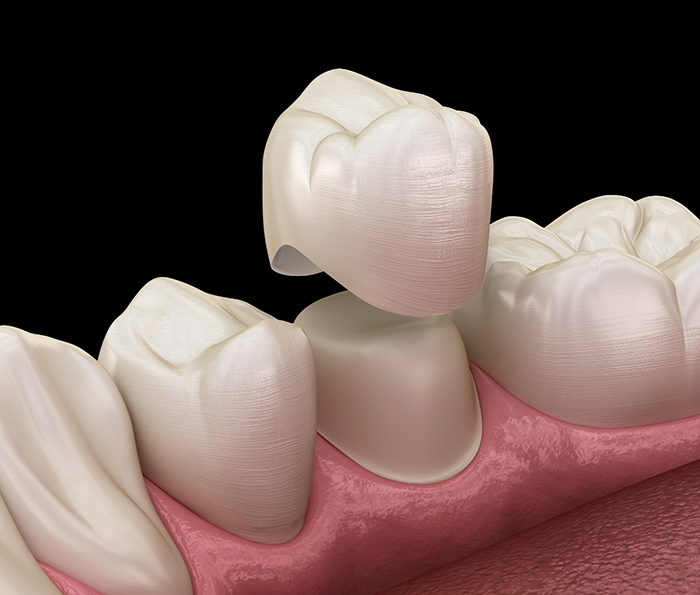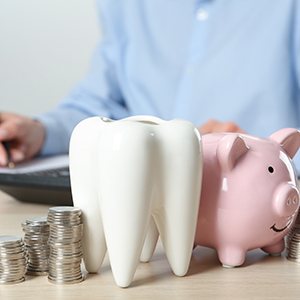Dental Crowns Salmon Creek
First-Rate Protection for Vulnerable Teeth

Salmon Creek Complete Dentistry is not just any dental clinic – we’re your trusted partner for a healthy, sparkling smile. Our team takes immense pride in delivering top-tier services like our highly acclaimed same-day dental crowns in Salmon Creek. But we go beyond treatment; we nurture each patient with personalized care and easy-to-understand education, so you can confidently maintain a radiant smile long after you leave our dental office. Come over for a relaxed chat and let us devise an ideal plan just as unique as you are!
Why Choose Salmon Creek Complete Dentistry for Dental Crowns?
- CEREC Technology Used to Craft Same-Day Dental Crowns
- Dentist Who Leads with Integrity While Producing Excellent Results
- Digital Impression System for Accurate Dental Restorations
What Is a Dental Crown?

A dental crown is a type of dental restoration that completely covers or “caps” a damaged tooth or dental implant. Crowns are custom-made to fit over the entire tooth, from the gumline up, offering an ideal solution for broken, decayed, or misshapen teeth.
They not only improve your smile but also make chewing more comfortable by restoring the shape and size of your original tooth.
Made from various materials, including porcelain and ceramic, crowns imitate the appearance of natural teeth while providing comparable durability and strength. They can be crafted in a dental lab or with the help of CEREC technology, which Dr. Kelly readily uses to deliver faster results.
If you’re having a root canal, our expert dentist might recommend a dental crown to protect the weakened tooth after treatment.
Benefits of Dental Crowns

Learning that you need a dental crown to better protect a damaged or decayed tooth may not be what you hoped to hear while visiting our office. However, you’ll find that the benefits of dental crowns are worth the time and effort. These custom restorations:
- Can replace large fillings when teeth lack sufficient structure, ultimately offering protection against further damage.
- Play a significant role in the cosmetic dentistry field by helping improve your smile’s appearance.
- Protect your oral health. Besides safeguarding against decay or breakage, porcelain or ceramic crowns closely match your natural teeth color, giving you an aesthetically pleasing and seamless look.
- Are custom-made to fit over each tooth perfectly, based on its size and shape.
- Offer full functionality, so you can eat comfortably again without experiencing any discomfort while chewing food, which is one less thing to worry about in your journey toward impeccable dental health.
Understanding the Cost of Dental Crowns

Dental crowns can build up and protect damaged teeth from additional harm. However, many people put off treatment because they are worried about the cost. During your visit with us, we will go over the expected cost of your treatment in detail, including your payment options, so you don’t run into any surprises. Until then, here are some things to keep in mind.
Dental Crowns FAQs
What are Dental Crowns Made Of?
Historically speaking, dental restorations like fillings and crowns were made from amalgam metals, which
are known for their durability. However, these materials don’t bond with your enamel and expand
and contract with temperature changes, which can damage the underlying tooth.
Today, Dr. Kelly and the rest of our team in Vancouver, WA, utilize resilient ceramic to create lifelike
dental crowns that can be customized to match the shape, hue, and size of your natural teeth for
seamless results. Whether you opt for a same-day CEREC restoration or a more traditional prosthetic
created in a lab, the durable porcelain resists chips, cracks, and stains and is more discreet than
shining gray metal.
How Long Do Dental Crowns Usually Last?
Once Dr. Kelly cements your new tooth over the abutment or implant responsible for holding it in place,
it’s not intended to be removed except by a professional. Usually, these tooth-shaped covers last
anywhere from 5 to 15 or more years, though it depends significantly on how well they’re cared
for.
Some factors that impact its longevity include:
- Your diet. Avoid hard, crunchy, and chewy foods that might damage your crown, wear
it down prematurely, or push or pull it out of place.
- Its location. Restorations covering molars tend to sustain more damage from biting
and chewing and may be more likely to wear down faster.
- Your oral hygiene. Cleaning your mouth consistently prevents common dental problems
that can cause your crown to fail.
Do Dental Crowns Get Cavities?
Many patients want to know whether they need to worry about their dental crown developing cavities.
Thankfully, it’s not made from the same organic material as your teeth and won’t erode the
same way. However, the tooth beneath it can still be affected by decay and disease, so you must
consistently clean your mouth to keep it in good shape.
You can maintain your new tooth by brushing and flossing twice daily to remove plaque and bacteria that
contribute to cavities and periodontal problems. Also, visiting our team every six months for a routine
checkup and cleaning allows us to monitor your condition to catch and address any areas of concern, like
eroded bonding cement, before more damage is done.
How Do You Know When Your Dental Crown Needs a Replacement?
If your restoration feels wobbly or destabilized, it’s normal to wonder whether it can be
recemented in place or if you should replace it altogether. Although the only way to know for certain is
to consult our team, some indicators that your crown is nearing the end of its life can include:
- If the tooth underneath the prosthetic is damaged or decayed, you might feel a sharp or sensitive
feeling when biting down or eating anything too hot or cold.
- Loose fit. A restoration that wiggles in place is at risk of being dislodged
altogether and deserves a professional assessment as soon as possible.
- Worn appearance. These caps are intended to rebuild your grin’s functionality
and Investing in a new one can boost your confidence if yours looks stained, worn down, or
damaged.
What are Dental Crowns Made Of?
Historically speaking, dental restorations like fillings and crowns were made from amalgam metals, which are known for their durability. However, these materials don’t bond with your enamel and expand and contract with temperature changes, which can damage the underlying tooth.
Today, Dr. Kelly and the rest of our team in Vancouver, WA, utilize resilient ceramic to create lifelike dental crowns that can be customized to match the shape, hue, and size of your natural teeth for seamless results. Whether you opt for a same-day CEREC restoration or a more traditional prosthetic created in a lab, the durable porcelain resists chips, cracks, and stains and is more discreet than shining gray metal.
How Long Do Dental Crowns Usually Last?
Once Dr. Kelly cements your new tooth over the abutment or implant responsible for holding it in place, it’s not intended to be removed except by a professional. Usually, these tooth-shaped covers last anywhere from 5 to 15 or more years, though it depends significantly on how well they’re cared for.
Some factors that impact its longevity include:
- Your diet. Avoid hard, crunchy, and chewy foods that might damage your crown, wear it down prematurely, or push or pull it out of place.
- Its location. Restorations covering molars tend to sustain more damage from biting and chewing and may be more likely to wear down faster.
- Your oral hygiene. Cleaning your mouth consistently prevents common dental problems that can cause your crown to fail.
Do Dental Crowns Get Cavities?
Many patients want to know whether they need to worry about their dental crown developing cavities. Thankfully, it’s not made from the same organic material as your teeth and won’t erode the same way. However, the tooth beneath it can still be affected by decay and disease, so you must consistently clean your mouth to keep it in good shape.
You can maintain your new tooth by brushing and flossing twice daily to remove plaque and bacteria that contribute to cavities and periodontal problems. Also, visiting our team every six months for a routine checkup and cleaning allows us to monitor your condition to catch and address any areas of concern, like eroded bonding cement, before more damage is done.
How Do You Know When Your Dental Crown Needs a Replacement?
If your restoration feels wobbly or destabilized, it’s normal to wonder whether it can be recemented in place or if you should replace it altogether. Although the only way to know for certain is to consult our team, some indicators that your crown is nearing the end of its life can include:
- If the tooth underneath the prosthetic is damaged or decayed, you might feel a sharp or sensitive feeling when biting down or eating anything too hot or cold.
- Loose fit. A restoration that wiggles in place is at risk of being dislodged altogether and deserves a professional assessment as soon as possible.
- Worn appearance. These caps are intended to rebuild your grin’s functionality and Investing in a new one can boost your confidence if yours looks stained, worn down, or damaged.



